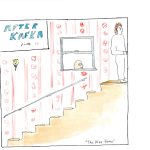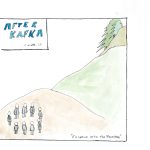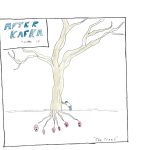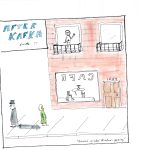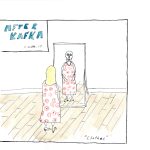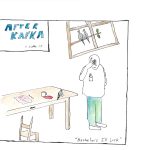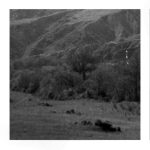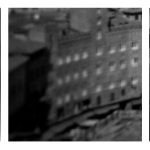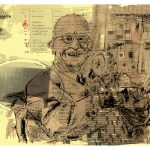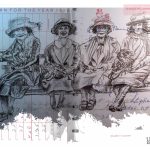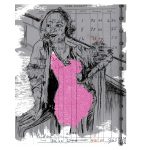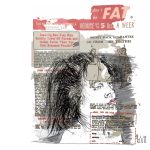“You’re my stars,” she used to say. “My Indiana and Tennessee.”
She named us after the places we were born. Once, I asked her why she didn’t name us after more exotic places, like California, Kenya. I would have liked to be named California—then when people said my name they’d think of hot sand between their toes and palm trees shimmering in the heat. They could call me Cali for short. But my mom said she named us the way she did because she wanted us to remember our roots.
“You’re a mountain girl, Indi,” she said, “And don’t you forget it.” As far as I knew, there were no mountains in Indiana, but I didn’t bother to mention it. It’s not like I remember Indiana. We moved to California soon after I was born, because my mom wanted to “try her hand in the music biz out West.” But I don’t really remember California, either, at least not the parts I want to remember, like the beach. I remember this blue couch we had in our apartment that had bed bugs. They covered me with so many bites that my mom thought I had chicken pox. I got chicken pox, too, but that was later.
When I was still small, some music producer told my mom her voice would be perfect for country music, so we hightailed it back in the direction we’d come from, but we stopped in Texas for a few weeks that turned into a few years. Some of my first real memories are of Texas, of the high electric whine of the cicadas and the way our porch sloped down to the right.
In Texas, it was just the two of us. Mom had a gig performing at this little bar every night except Friday and Saturday. Because there was no one else to look after me, I went along. Some nights I slept in the car, but some nights I sat on a stool just behind the stage, smelling the old cigarette smoke that had gotten trapped in the curtains and watching Mom. I remember her wearing a red sequined dress and sandals that had bows on the straps. I’m sure she didn’t always wear this outfit, but in my memory it’s the only one she ever wears. She’s singing “Ring of Fire,” my favorite song, making her voice go all deep like Johnny Cash’s because she knows that, behind the curtains, I’m laughing quietly into my small fist.
We left Texas after Mom got into a fight with the manager of the bar. He said she was late to work too much, and she said she didn’t know why the hell she was wasting her time in that Podunk town anyways when she should be making it big in Nashville. I loved that word, Podunk. I said it all the way to Nashville, every time we hit a pothole in the road. “Po-dunk, Po-dunk, Po-dunk,” I said, and Mom laughed and laughed. I later learned from a library book that the word “Podunk” was originally the name of an Algonquin tribe that lived in Connecticut. Like just about everything else, we took it from the Native Americans and made it our own. Typical. I told Mom this fact when I read it, and she said “Hmm, interesting,” in a way that told me she wasn’t listening.
When we got to Nashville, two things happened: one, I got really good at telling time, and I set our kitchen clock an hour early so Mom wouldn’t be late to work. Two—well, you guessed it. Tennessee was born. I was six by that point. Mom complained a lot when she was pregnant with him that he was preventing her singer-songwriter career getting off the ground, but when he was born, we were both equally enthralled with him. When Ten was awake, he was red-faced and squalling most of the time, but when he slept, he looked like an angel. Mom and I used to both stand over his crib and watch him sleep, saying things like “Look at his tiny nails” (me) and “Do you think he has dreams yet?” (Mom).
Ten’s dad was around for a while, before he wound up in jail for the first time. Mom later told me incredulously that she really did, yes, she really had, believed that he made all his money selling handmade ukuleles, but I’m sure she must have known he was selling drugs. After he went to prison, Mom stopped using his given name and started calling him Sonofabitch Lee. At least Sonofabitch was a real person, though, a person I had met and known for a short while before Ten was born. I remember his mustache and the snake tattoo coiled around his lower right arm. That was more than I could say of my own father. But on the other hand, at least I knew that my own father didn’t come looking for me because he didn’t know I existed. That was better than Sonofabitch, who didn’t seem to care at all about Ten because he never came to visit even when he wasn’t in prison, and he never paid his child support payments on time, and even when he did pay them it was probably with the money from stolen car radios or something.
In Nashville, Mom got another job at a bar because she said it would help her connect with music business types. She also got to sing at the open mic nights every Friday, which she said was “a good way to get exposure.” Mostly, Mom’s job meant that she stayed out late at night and slept most of the day while we were at school. This in turn meant that I was in charge of getting us up and fed and out the door in the mornings, which meant we were almost always late to school. We brought home stacks of pink slips, piled them on the kitchen counter. Mom didn’t care, though. She sat on the couch in her pajamas, strumming a ukulele. She said, “Listen, you two. School is just a way to brainwash you and keep you out of trouble during the day. The public school system wrings the creativity right out of kids like you! If I didn’t have to work so blasted much, I’d homeschool you and y’all could finally learn three-part harmony.” We lamented this right along with her. Like a lot of Mom’s plans, it seemed really great and also far out of reach.
This one time when I was ten or twelve, Mom came home late from her shift at the bar and wedged herself next to me in bed, waking me up. I rolled over and mumbled, “What?”
She leaned in and kissed me on the forehead and I said, “You smell like beer,” and she said, “That’s what happens when you work in a bar,” and I said, “No, your breath smells like beer.”
“Scrunch over, Indi,” she said. “My bed is lonely tonight.” I moved over, but I rolled to face the wall. After she fell asleep with one arm draped over my back, I stayed awake glaring at the wall. I have to remind myself, now, that she didn’t always come home with beer on her breath, because that one memory stuck so insistently.
The year he was six, Ten decided he really wanted a dog. I mean, really wanted one. Of course, we weren’t allowed to have pets in our apartment. He kept checking out this book on dog breeds from the public library, and he’d lie on the dirt-colored carpet in the living room and study the big color pictures, debating aloud the advantages and disadvantages of various breeds, as if the only reason we couldn’t get a dog was because he couldn’t decide which breed he wanted. He’d spend hours sketching, mostly Briards, the breed he loved best. They’re these enormous French dogs that look like a cross between a German shepherd and an Afghan hound.
Mom would lean over the table, curlers still in her hair, and say, “Wow, Ten-nes-see! Amazing!” She didn’t ask if he had any homework. Not like she could have helped him with it. She was a terrible speller, and anytime she spelled his name she had to say aloud, “Two n’s, two s’s, one-two-three-four e’s. Tennessee.” I was the one who helped with spelling and fractions and the state capitals of Louisiana and Arkansas. I was the one who made mac and cheese or tuna salad for dinner, because Mom left for work right around dinnertime.
Anyway, instead of a dog, Ten had this red rubber frog that he treated like a real, alive pet. He called her Strawberry, because we figured out from another library book that she was probably a strawberry dart frog. She had black spots on her back, and in order to make her look more realistic, Ten colored her legs with black Sharpie. We read in the book that some of these frogs have what’s called a “blue jean color morph,” which means that their legs are blue instead of black. But we didn’t have a blue Sharpie, so Strawberry wore black pants always, like Johnny Cash. Strawberry fit perfectly in Ten’s palm or in the pocket of his jeans. She went to school with him every day, and no one knew about it. In the evenings, he fed her baby carrots, because Mom had banned him from bringing ants into the apartment. Strawberry swam in the tub when he took a bath. She slept on his pillow next to his head, although she usually fell off during the night, and then we had to frantically search the sheets for her in the mornings.
I worried that what Ten needed was not a dog, or a frog, but a friend. Neither of us hung out much with kids from school. Parents weren’t too keen on letting their children come over when there were no adults in the apartment, which was often the case. Sometimes Ten went to play at other kids’ houses, but I didn’t hang out with people my age because I was always watching Ten. I didn’t really mind. Most of the time it felt like a relief to be able to say, “I’m sorry, I can’t. I have to watch my brother.” Watching Ten meant playing hours of Monopoly with our own made-up rules (Strawberry guarded the jail, and you had to pay her to get past, and we added liberally to the pile of free parking money, like whenever anyone rolled a six or a three). It meant reading aloud Peter Pan, doing a voice for Hook that always made Ten laugh. It meant dragging the sandbag weight of his body off the couch and into his room when he fell asleep, so he wouldn’t be woken up when Mom stumbled in late and turned all the lights on.
Of course, we fought sometimes, and of course sometimes I resented him. Sometimes he got in the way, like the summer I was fourteen, when this girl in my class, Maggie, got a job at a retro drive-in movie theater. I desperately wanted to work there with her, to carry the trays of popcorn and wear roller skates and these cute short dresses with frilly aprons attached. But Mom said I couldn’t. I had to watch Ten.
Ten also got in the way the year I turned sixteen, when I fell in love with a boy named Dallas Leland. The infatuation began, of course, with the fact that he, too, was named after a place, and a place I’d actually been, at that. But I wasn’t the only one fascinated with him. Dallas Leland was one of those people who got popular in high school not by any particular effort or because he had any particular charm. People were drawn to him for two reasons: first, his spectacular hair, and second, the fact that he didn’t talk. I mean never talked. He sat right in the front row of our U.S. history class and never once raised his hand. None of the rest of us could imagine being that bold, so we spent more time watching him than watching the teacher, Mr. Francis. We wanted to see what Dallas Leland would do if Mr. Francis got the guts to call on him. That, and we loved looking at Dallas’s hair, the red-gold color of it, and the way it swooped out from a point toward the middle of his skull, just a little left of dead center. His hair was the color of sunlight, and if Dallas’s head had been the sun, I would have willingly blinded myself to look at it every fifth period. Luckily, I didn’t have to pay much attention in that class. Ten was learning a lot of the same things in fourth-grade history, so I knew everything I needed to know from studying with him.
Our final project that spring was to be done in pairs. We were to write the story of an American tragedy from two perspectives. The project instructions didn’t really say “tragedy.” I added that part. The instructions said “significant and controversial event.” But events that are controversial are always a tragedy for somebody, I think.
In the interest of fairness, Mr. Francis had us write our names on slips of paper and drop them into Eric Poleski’s cowboy hat. Then Eric, who in cowboy boots was a solid five-foot-five, swaggered around the classroom and let us pluck the pieces of paper out of his hat. While I waited for my turn, I sat with my hands wedged between my legs, all eight of my non-thumb fingers twisted around each other in pairs for luck. Apparently, it worked. When Eric held that hat out to me, I snatched up the piece of paper with a D on it scratched in blue ink. Dallas in messy boy handwriting shone up at me from the crumpled sheet. I looked across at him in triumph. He was looking out the window, apparently uninterested in the project proceedings. He probably had more important things to think about. I thought he must be writing a novel in his head or coming up with the next equivalent of the Theory of Relativity. He was glorious. He was going to be mine.
After school, Dallas stood at the center of a group of people, all of whom were always talking. Dallas didn’t talk. He smoked. The chances of getting him alone were slim to none, so I approached this group, clinging to the straps of my backpack. I can see myself now, my hair falling out of my braid, my shins spattered with bruises in shades from purple to green from playing with Ten, not realizing I was breaking every social rule there was to break by approaching him in this way. What did I know of social rules? My life took place outside of them.
The group parted as I approached, standing aside to look at me. A couple of the boys hid smirks behind their hands, and in my presence the girls grew interested in pulling at the ends of their hair or adjusting the pleats of their cheerleading skirts. I saw all this. I realized what it meant. But it was too late to let it deter me.
“Hi, Dallas,” I said. He looked at me through a cloud of smoke.
“We should talk about a time to work on our history project,” I said.
“Yeah, Dallas,” said one of the boys. “Our history project.”
I held my ground; I didn’t blush. My heart was clattering around, ricocheting off my ribs like a bowling ball off bumpers, but they couldn’t see that.
Dallas nodded. He let his cigarette fall to the ground and smashed it with the toe of his shoe. He walked a little way away from the rest of the group. I was so surprised by this that it took me a moment to follow. I could hear their murmurings behind me, not the words themselves, but the hostile, jealous tone of them.
We stood facing each other under a tree. I realized I’d never faced Dallas before. He had a tall, reedy body that drooped forward a little. His eyes were brown with flecks of gold in them. They were a little unnerving in their intensity. I dropped my gaze to the ground.
“So,” I said to the grass, “Maybe we should go to the library after school one day?” I thought of the library, sadly, because I knew that Ten would have to come along, and the library was a place he could stay occupied for hours. Dallas might not even know Ten was there with me. Dallas and I could work side by side, leaning over the same book, reading about the Cherokees and the Trail of Tears, breathing the same air, until Dallas had fallen in love with me (it seemed to me that simple). Then I could retrieve Ten.
I waited for Dallas to say something. What would his voice sound like? For a moment I thought, Is he actually mute?
“Hate the library,” he said finally. His voice sounded like any other voice, like a regular boy’s voice. “How ’bout by the river? Over by the bridge? Saturday afternoon?”
“Oh, umm, okay,” I said. “I’ll check some books out.”
I wanted him to say, “Don’t bring the books. It’s a date.” But he didn’t say anything. Just nodded.
“I’ll bring some sandwiches, too,” I said. Food meant it was a date, didn’t it? I just had to find a way to get Mom to watch Ten.
That afternoon when I got home, Ten was sitting on the kitchen counter eating ice cream out of the container, and Mom was dancing around the kitchen in her underwear. The silk kimono that she wore as a bathrobe was fluttering around her as she spun in circles, though there was no music on.
“What’s going on?” I said, dropping my backpack on top of the jumble of shoes by the front door.
“Indi!” cried Mom, rushing over and grabbing my hands, dragging me into her frenzied dance. “Great news! I’m headlining!”
“Where?” I gasped. I saw it all changing, finally, all of it actually happening, everything she’d always talked about. We’d go on the road with her; we’d have private tutors instead of school. We could travel all over, go all the way to California again. We’d sit in the front row at her shows. We could afford a real house, out in the country. We could grow sunflowers and have a vegetable garden, and Ten could get a dog.
“Open mi nigh,” Ten said, around a mouthful of ice cream. I pulled away from Mom.
“Open mic night?” I said. “How do you headline at open mic night?”
“I’m not headlining at open mic night,” she said. “I’m headlining before open mic night. I get to do my own show—well, with Frankie.” Frankie was Mom’s music partner of the moment, a guy with a thinning ponytail and a perpetually doleful look.
Mom was still talking. “…Amazing! You guys are going to come! Get dressed, everybody, because we’re going shopping!”
“You’re the only one who’s not dressed, Mom,” I said. This made her laugh, and she disappeared into the bedroom, still chattering.
“You have homework?” I asked Ten.
“Did it in class,” he said.
“Can I have a bite?” I asked. He proffered his spoon, but I dug in the silverware drawer for one that was less spitty. I felt suddenly tired, not like I wanted to take a nap, but like I needed to lie in a dark, quiet room for about ten years and not move. I didn’t realize at the time that that feeling was sadness. All I knew was how it would go at the shops, how Mom would flirt with all the shopkeepers, men and women alike, how she’d tell everyone she met to come to her show, how she’d pull armfuls of things off the racks and shove them at us through the curtains of the dressing rooms, how she’d make us come out and turn around in circles for everyone in the store to see, how she’d buy more than we needed and more than we could afford, and that when I tried to draw her aside at the checkout and tell her not to do this, she’d laugh loudly and say, “That’s my Indiana!” and she’d strangle me in a hug and buy everything anyway.
Friday night came, and I found myself wearing a black dress, the first one I’d ever owned, and a pair of new boots that pinched at the ankles. My skin was a sleek golden tan, my hair about four shades darker, and Mom had carefully lined my eyes for me. I looked good and I knew it, and I wished that Dallas Leland were there to see it. I imagined him sitting there, looking at me across the table, his eyes flicking up and down with a question to which the answer was YES. But even imagining it was spoiled by the thought of my mom up on the stage. Even if we did date, I could never invite him to watch my mom perform. I had at least enough concept of social etiquette to know it would be humiliating for everyone involved. Except, of course, my mom.
The first thing she did when she got on stage was wave to us and point us out to the audience and say that she was dedicating her performance to us.
“Those are my stars,” she said, “My Indiana and Tennessee.” People who didn’t know her probably thought that was some kind of strange metaphor, not our actual names. Those are my stars, my Indiana and Tennessee.
We weren’t really supposed to be in the bar, of course, so the owner, Larry, put us at a little table in the corner where he could keep an eye on us and keep us well supplied with Shirley Temples. I didn’t like maraschino cherries, but Ten did, so every time Larry brought me a new drink I pulled them out and gave them to Ten. He left one sitting on a napkin for Strawberry, who he’d placed on the table. He wanted her to be able to see the show. Just that afternoon he’d carefully recolored her legs, which had begun to wear off after all their baths together, despite the supposed permanence of Sharpie. She was all spiffed up for the occasion. Ten was wearing a short-sleeved button-up shirt with small green cacti on it, and a blue bow tie that Mom had insisted on even though he said he felt like it was choking him. He kept tugging at the tie, but whenever I looked over at him he gave me a big smile, showing the quarter-sized gap in his front teeth that would never be fixed because we couldn’t afford braces.
Mom was up there on stage with Frankie, who was the real headliner, because the sign out front said “Frankie Ray with Lilah Archer.” Mom’s real name was Debra Moore. It was lucky for Mom that Frankie was a pretty laconic guy, because she liked to talk a lot in between songs. After they did a few songs of Frankie’s, dragging ballads about lost loves, she looked over at us.
“Now we’re going to speed it up a little,” she said, winking at me, “And play an old favorite by Mr. Johnny Cash.” She said Cash with an affected drawl. Mom didn’t naturally have a drawl. She was from Idaho. (Thank goodness she didn’t name one of us that.) They played “Ring of Fire,” of course. Mom’s voice sounded okay. Sometimes she tried too hard to make it sound twangy and it went flat. The muscles in the back of my neck tightened when she leaned in too close to the microphone and it made a staticky humming sound. She looked at Frankie a lot when they were singing and went over to sing into his mic with him. It occurred to me that there was something going on between them. Did he come over to our apartment while we were gone during the day? Was he the source of the cigarette smell that I’d noticed a couple of weeks before, the time Mom said she didn’t know what I was talking about? She could have lied better than that. She could have just said Frankie came over to work on some music.
Mom’s hair glowed in the stage lights. It was long and red and curly, like Reba’s. It wasn’t naturally like that. Naturally it was straight and light brown, like mine. But Mom’s hair was part of what she called her “presence.” That and her sparkly eye shadow and the big gold earrings she wore. When I was a kid, I’d thought she was the most beautiful thing I’d ever seen, like a real fairy. That night, I saw that the sparkles over her eyes did nothing to conceal the bags beneath them. When she bent her head down to lean into the mic, you could see her brown and grey roots like a sad river down the center of her scalp. In her rhinestone cowboy boots and her long lavender dress, in the haze of cigarette smoke and the glare of the stage lights, Mom looked like something not quite real. She wasn’t quite real. She was something of her own creation.
That night, I saw through her caked-on makeup. She looked old. I realize now that she wasn’t that old. She was only thirty-seven the year I was sixteen. Not that old at all. But too old to start a singing career. Too old to be wearing sparkly eye makeup on a stage when her half-grown kids were in the audience. I looked at the people around us. Most of the audience was middle-aged, too, a mix of married couples trying to rekindle their dying love, divorcées on first dates trying to kindle new love, and alcoholics who were there not for the performance, but because they were there every other night of the week, too. This wasn’t where the music business people came to scout for talent on Friday nights. I looked at Ten, at his bright round face. He saw me looking and smiled. He still thought she was beautiful. He still believed in the magic. I tried to smile back at him, but my face felt like silly putty, all rubbery and stretched-out. It was ten o’clock when they’d started their set, already past the time he should be in bed.
The next morning (by which I mean noon) found Mom and me whisper-yelling in the kitchen, trying not to wake Ten up.
“Do you even know this boy at all?” she hissed.
“It’s a school project, Mom!” I said. “It’s worth twenty percent of my grade!”
“If you get pregnant,” she said, “Your life will be over.” She made a sweeping gesture in the air that I thought perhaps referred to her own life.
“MOM!” I said. “It’s not a date!”
“Well, I can’t watch Ten,” she said. “Frankie and I are re-recording some tracks over at Wild Oats.”
“Reschedule it!” I said. “Take Ten with you! He’ll be quiet.”
“Why don’t you reschedule, Indiana?” she said, in a scarily quiet voice. “You can do your project after school one day. This is my career we’re talking about.”
“Oh, Jesus Christ, your career!” I yelled. “What number demo is this, Mom?” I didn’t even get a chance to say anything about how I knew she was sleeping with Frankie. Ten came in with sleep-mussed hair and round eyes and said, “What’s going on?” and we both said, “Nothing.”
Mom went back to her bedroom and I could tell she was starting to cry, which made me even angrier, so I pulled five dollars out of her wallet and said to Ten, “Wanna go get ice cream and then go down by the river?”
When Dallas arrived, Ten was playing with Strawberry in the reeds on the edge of the river. He’d been delighted to go. He wanted to look for real frogs to be her friends.
“Do you think the river frogs will like her even though she’s a tree frog?” he’d asked. She’s not even a real frog, I thought, but my mouth was full of ice cream, so I had a good excuse not to say anything. I’d watched him kneeling there for some time, paddling her around in the ripples of the shallow water. The river was wide and green and fast. It was a warm day and people were out kayaking and the tourist cruise boats were full.
But then Dallas’s stoop-shouldered form appeared, and I was suddenly only aware of the way my sweaty palms were sticking to the plastic cover of the library book on my lap. I’d completely forgotten about sandwiches. I hoped he wouldn’t be mad.
Dallas raised a hand in greeting as he approached. He sat down on the opposite end of the bench I was sitting on. He pulled out a packet of cigarettes and shook one out, held it out to me. I shook my head.
“I forgot the sandwiches,” I said. “I’m sorry. We could go get some—after.” Dallas lit his cigarette and nodded once.
“That’s my brother down there,” I said, gesturing toward Ten, who was peering into the reeds a little way down the bank. “I couldn’t get out of watching him.” Dallas nodded again, leaned back on the bench, and blew smoke toward the sky. I suddenly realized that I couldn’t think of a single other thing to say to him. It was as if my mind had been wiped blank. If you’d asked me my name at that moment, I don’t know if I could have told you.
“So,” I said, after a long moment. “The Trail of Tears. You wanna do the side of the Native Americans or the side of the Jackson administration?” We were supposed to each pick a side.
Dallas had been looking out at the river. He looked at me with his gold-flecked eyes. “Trail of Tears, I guess,” he said. “Sounds cool.”
I stared at him, waiting to see if he was joking. He stared right back at me. Apparently not. The sunlight reflecting off his hair sure was beautiful, though.
“It’s all the Trail of Tears,” I said, trying not to sound impatient. “You have to pick a perspective to tell the story from. Andrew Jackson or the Cherokees.”
“Jackson,” said Dallas dreamily. “Stonewallllllll Jackson.” I stared at him. Was it possible that he’d paid no attention in history all year? Still, Albert Einstein hadn’t done well in school. I decided to take a different tack.
“So, Dallas,” I said. “What are you into, outside of school?”
“Nintendo. Basketball. Def Leppard.”
I glanced over at Ten, leaning over the reeds, looking for frogs. I was going to tell him to come a little closer, but then Dallas said, “So, are we gonna make out, or what are we doing here?”
“What?” I said. I think I was as shocked hearing that many words from him as I was by the content of them.
“Isn’t that what you wanted?” he asked. I thought the vein in my neck might explode, my pulse was suddenly pumping so hard.
“I—” I started to say.
“STRAWBERRY!” Ten’s shriek is something I cannot forget. The pitch of it, the raw, searing terror and grief. Before I could scream NO, before I even really had time to think it, my brother had thrown his small body into the river after his plastic frog.
He didn’t think; I know that. He thought only of the thing he loved most, the thing he couldn’t bear to lose. He did what he felt he had to do not to lose her.
I saw Ten’s head, an arm; I thought I saw his eyes looking wildly toward the sky, but who knows if that’s something real or something I imagined. The current was swift; his head, bobbing, was dark like a log drifting downriver.
“TEN!” I screamed. “TEN!” If you didn’t know, you’d think I was yelling out a score, a perfect score for diving, not for drowning in the river. People in boats looked at me at first like I was crazy, then they followed the line of my arm as I pointed at the water, at where I’d last seen his head, though I couldn’t see it anymore. I leaned out over the edge, my feet slipping and scrambling on the muddy bank. I wasn’t as sure as he was; I didn’t immediately fling myself into the water for the one I loved.
Dallas interpreted my flailing as preparation for a jump. He jumped in front of me and heaved me backward with a push of my shoulders, and I yelped as I felt my feet leave the ground. I thought I was falling in. We landed hard on the grass, Dallas on top of me, pinning me down. It knocked the wind out of me, so for a second all I could do was lie there, breathing frantically up at him. We were as close as we’d ever been and would ever be, but I barely even saw him. His hair, glowing in the sun, blinded me, and his dense odor of cigarette smoke burned my throat. As soon as I was able to get a breath, I shoved him off me and was back on my feet.
I searched the river for Ten, but I couldn’t see his head. There was a tourist boat in the process of trying to turn around to go after him, but it was too slow, clumsy in its bulk. On the deck, people were shouting, waving at me, but I just stood there and stared at them, my body rigid and motionless. What good did they think they could do? For those people, this was a story they’d be able to tell about their vacation, about that one day, oh, what a calamity, that poor little boy. For me, it was—“Oh, god, I see him!” I slapped at Dallas’s arm as I saw my brother’s round, pale face struggling to stay above water.
It was a crew team that got him. I watched them strain against the current, pulling hard on their paddles just to hold the boat in one place. The coxswain made an elegant little dive off the front of the boat, barely making a splash. He didn’t surface, and for a moment I thought he’d drowned, too. I couldn’t see that he’d come up on the other side of the boat, that he held my brother tight in his arms against the pull of the river. When the crew team leaned in and dragged a person into the boat, I thought it was the coxswain. He was small, too, though not as small as Ten. It was only when they heaved a second person into the boat that I realized the first body had been my brother’s. It wasn’t until I saw the oarsmen propping him up against their knees, his small body shaking and alive, that I began to cry.
When the crew team came to shore with Ten, when the ambulance came, I couldn’t even look at Dallas. I should have thanked him for anchoring me on the shore, so someone didn’t have to rescue me, too. But I felt that by wanting him, I had caused this to happen. If I hadn’t wanted him so badly, we would have stayed home; I would have kept my brother safe, far from the water. I watched two paramedics hold Ten upright while he coughed and coughed. I saw his small body heaving, his lips the deep blue-purple of a fresh bruise. I thought, If he lives I will never want anything again that is not for him. I will never ask for anything for myself. When I turn eighteen I will buy us a trailer out in the country. I will buy him a dog.
Dallas didn’t come in the ambulance. We left him there on the riverbank. When we met up the following week (for the second and last time), all he said about the incident was, “That was wild, huh? Hope the little guy’s okay.” The day of the presentation, I spoke for the Cherokees while he held up the poster I’d made, and then he said a few sentences (which I’d written for him) from Andrew Jackson’s point of view. We got a collective grade, a B minus, which dragged down my average for the whole year, but I didn’t care.
Before that, we sat in the blue light of the hospital, Mom and me, on either side of Ten, holding his hands while he slept. I moved my arm, and it rustled the papery sheets. I looked at him in apprehension to see if it would wake him, but it didn’t. They’d drugged him pretty good. The half-moons of his eyes, fringed by lashes, stayed closed. I looked across at Mom. Slow tears were sliding down her face, creating muddy mascara tracks on her cheeks.
“You have to give it up, Mom,” I whispered. “We need you at home. You’re supposed to take care of us.”
“What do you mean?” she asked.
“You know what I mean,” I said.
“I can’t,” she said. She shook her head vigorously, her red curls bouncing. They seemed so garish, so out of place, in that otherworldly light.
“Mom,” I said.
“You’re my stars,” she said. “I wanted it all for you.”
“You didn’t want it all for us,” I whispered. “You wanted it all for yourself.”

